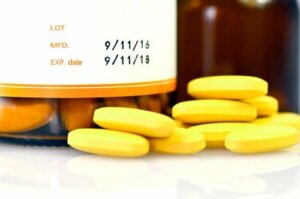The Expiration Date of Medicine: Does Effectiveness Decrease?

The expiration date of medicine is the date until which the stability of the drug in its original container, unopened or untouched, and kept in adequate conditions, is guaranteed.
Legally, there’s a maximum expiration limit of 5 years. However, it could be less than 5 years and, in that case, there’ll be an indication on the package.
What’s the expiration date of medicines?

The expiration date of medicines usually appears in the format MM/YYYY. That is, two figures indicating the month and four figures indicating the year, separated by a slash.
The actual expiration date is the last day of the month that appears. Therefore, the expiration date refers to the expiration of guaranteed stability and effectiveness. When a medication reaches its expiration date, the properties of the medicines may change.
What does the stability of medicine depend on?
The stability of a drug depends on several factors, including the following:
Temperature
One of the factors that most affects the preservation of medicine is temperature. That’s why it’s always advisable to store them in a cool, dry place. In addition, you must make sure that they don’t undergo sudden changes in temperature.
Pharmaceutical format and the expiration date of medicines
If the pharmaceutical format of a medicine is liquid, such as solutions, suspensions, or syrups, then they’re not as stable as the solid forms. In the case of solid dosage forms, you should look for any change in color or physical appearance. However, these changes are usually a sign of degradation of the excipient and not of the active ingredient.
Multidose drugs are those that you open several times for their administration, such as a syrup or eye drops. This can alter the stability of the drug and pose potential risks in terms of the effectiveness and safety of the drug.
Therefore, once opened, the expiration date no longer determines the period of validity. Rather, the period’s usually shorter, and the package insert will offer necessary details.
To remember when you opened it, it’s advisable to write the date it was opened or reconstituted on the package. In any case, it’s best to discard the remaining medication after the treatment has been completed.
If we’re talking about eye drops, and the period of validity once opened doesn’t appear on the container or leaflet, then the recommendation is a maximum of 4 weeks.
Discover: Antidepressants and Alcohol: What Effects Does Combining Them Have?
Will it still be effective a few months after?

Generally speaking, it may not be a problem to take a medicine that expired two months previously. However, it’s one thing for the expired drug to be more or less effective, and another thing for it to become toxic.
What does science say about drug expiration?
Research has taken place in recent years in several countries to test the purity and potency of drugs after their expiration date. However, it’s important to keep in mind that the storage conditions of the drugs in the study were always stored in optimal conditions.
The results have been surprising, as a high percentage of the medication retained at least 90% of its active ingredient after their expiration date. According to the standards of minimum effectiveness or potency that researchers expected by researchers, this is an acceptable figure.
Read also: 6 Mistakes that Cause Medications to Not Work
How to store your medicines

For a drug to remain in optimum conditions of safety and efficacy until its expiration date, you must store it correctly. To do so, pay attention to the following indications:
- Store it in a cool, dry place with no sudden temperature changes.
- Don’t put them next to electrical appliances. In this way, you’ll avoid electromagnetic fields.
- Keep them in their original packaging.
- If you use a pill box, only prepare it for a few days.
Conclusion
Most studies state that consuming medicine that’s expired doesn’t pose a real danger to your health. However, the most advisable thing is to avoid taking expired medication to avoid possible adverse effects.
All cited sources were thoroughly reviewed by our team to ensure their quality, reliability, currency, and validity. The bibliography of this article was considered reliable and of academic or scientific accuracy.
-
Debesa García, F., Fernández Argüelles, R., & Pérez Peña, J. (2004). La caducidad de los medicamentos: Justificación de una duda. Revista Cubana de Farmacia.
-
López Villarejo, L., Ramos López, E., Pérez Morales, A., de la Rosa Rosa, A., González Barrios, M., & Aparicio de Torres, M. (2001). Guía para la administración segura de medicamentos. Dirección de Enfermería.
-
BIOÉTICA, U. (2015). LOS OBjETIvOS DE DESARROLLO SOSTENIBLE. Persona y Bioética.
This text is provided for informational purposes only and does not replace consultation with a professional. If in doubt, consult your specialist.








